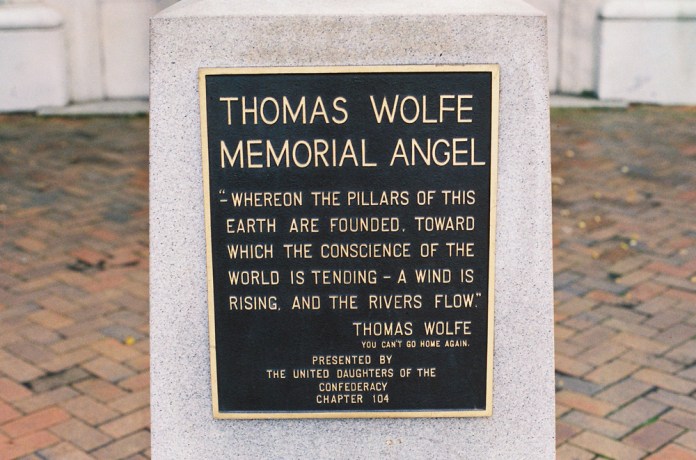I recently finished reading Thomas Wolfe’s paperweight of a book You Can’t Go Home Again.
The autobiographical novel, published in 1940, two years after Wolfe’s death in 1938, gets bogged down with scenes that could have been edited out with no loss of narrative structure.

Photo of Thomas Wolfe by Carl Van Vechten; the Carl Van Vechten Photographs Collection at the Library of Congress
However, I enjoyed embarking on a journey of self-discovery with the protagonist, a lonely young writer named George Webber, who pens a famous novel about his hometown, Libya Hill (a fictional setting that could be considered a stand-in for Wolfe’s native Asheville, North Carolina), and then is reviled by his friends and neighbors because the book uncovers the dark secrets of the town.
And although I found myself skipping over sections of the book—descriptions and digressions that slowed down the story—Wolfe’s lyrical voice and ability to construct stunning passages of prose can make a reader stop skimming pages and pay attention to each sentence.
Here are some beautiful paragraphs where Wolfe seemed to capture some central truths about life and humanity.
“So, then, to every man his chance—to every man, regardless of his birth, his shining, golden opportunity—to every man the right to live, to work, to be himself, and to become whatever thing his manhood and his vision can combine to make him—this, seeker, is the promise of America.”

Thomas Wolfe Memorial Angel, Asheville, NC (Photo by Francis DiClemente)
“For four years George Webber lived and wrote in Brooklyn, and during all this time his life was about as solitary as any that a modern man can know. Loneliness, far from being a rare and curious circumstance, is and always has been the central and inevitable experience of every man. Not only has this been true of the greatest poets, as evidenced by the huge unhappiness of their published grief, but now it seemed to George to apply with equal force to all the nameless ciphers who swarmed about him in the streets.”

Thomas Wolfe Memorial Angel Quote (Photo by Francis DiClemente)
“All things belonging to the earth will never change—the leaf, the blade, the flower, the wind that cries and sleeps and wakes again, the trees whose stiff arms clash and tremble in the dark, and the dust of lovers long since buried in the earth … they go back into the earth that lasts forever. Only the earth endures, but it endures forever.”

Thomas Wolfe’s mother’s boardinghouse in Asheville, NC. It’s now called the Thomas Wolfe Memorial. (Photo by Francis DiClemente)
“You can’t go back home to your family, back home to your childhood, back home to romantic love, back home to a young man’s dreams of glory and of fame … back home to the father you have lost and have been looking for, back home to someone who can help you, save you, ease the burden for you, back home to the old forms and systems of things which once seemed everlasting but which are changing all the time—back home to the escapes of Time and Memory.”
Wolfe, Thomas. You Can’t Go Home Again. New York: Scribner (A Division of Simon and Schuster, Inc.), 2011 (first published in 1940). Print.
I’ve heard about this book for a long time. Can certainly relate to his issues, universal ones, at this time especially when everything changes faster than ever. Interesting post.
Hey Janice. You make some good points. Thanks for taking the time to read the blog, and email me if you want to borrow my copy of the book to read! All the best to you in 2017.